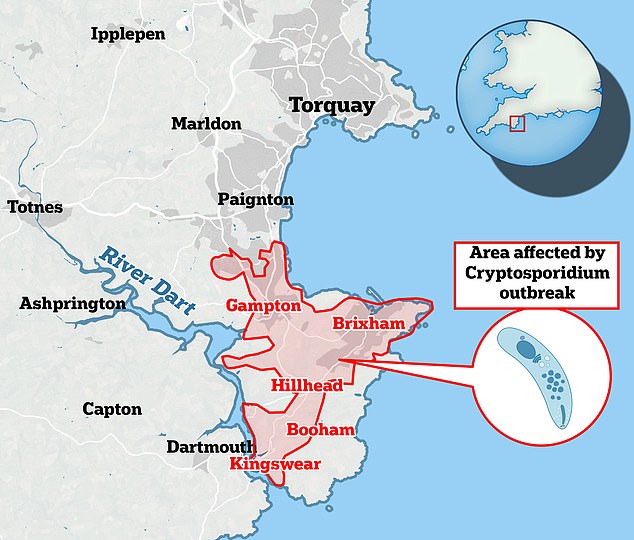One hundred people have now been struck down by cryptosporidium in Devon, health officials have warned.
Brixham’s ongoing outbreak of the parasite is believed to be linked to water contaminated with infected faeces making its way into the drinking supply.
Whole streets in the town have been infected, with victims forced to endure days of diarrhoea and agonising stomach cramps, with one sufferer even comparing them to ‘childbirth’.
Residents have also been forced to boil their own water since May 15 to ensure it is safe to drink and South West Water (SWW) bosses said ‘further intense work’ was still needed to ‘fully remove any contamination’.
The firm said it would automatically credit customer bills with £50 to compensate for the further inconvenience caused.
Brixham’s ongoing outbreak of the parasite is believed to be linked to water contaminated with infected faeces making its way into the drinking supply. Whole streets in the town have been infected , with victims forced to endure days of diarrhoea and agonising stomach cramps, with one sufferer even comparing them to ‘childbirth’ . Locals in Brixham, Boohay, Kingswear, Roseland and north-east Paignton in Devon were all told to boil water as a precaution
South West Water apologised to customers and gave them detailed advice on how to eliminate illness-causing organisms from their water
Latest figures from the UK Health Security Agency (UKHSA) show a further 23 cryptosporidium cases were logged by May 30 in the Brixham area (pictured) — raising the total number of confirmed cases to 100.
David Harris, the incident director at SWW, said over the past week reservoirs had been cleaned and the network had been flushed ‘several times’ in Brixham.
A boil water notice remains in place in parts of the town and Mr Harris said the company needed to be ‘absolutely confident we have fixed this problem’ before the notice was lifted.
Latest figures from the UK Health Security Agency (UKHSA) show a further 23 cryptosporidium cases were logged in the Brixham area by May 30 — raising the total number of confirmed cases to 100.
It is believed a damaged air valve on private land was the source of the outbreak which ‘may have allowed animal waste or contaminated groundwater to enter the local supply’.
Sarah Bird, a consultant in health protection at UKHSA South West said: ‘The data shows the outbreak is associated with people who live in, or visited the boil water notice area of Brixham and the nearby areas before the notice was put in place.
‘While further cases may be reported due to the time lag between exposure and falling ill, the number of cases being reported is slowing down.
‘As with any other sickness bug, it is really important to follow good infection prevention measures such as handwashing with hot soapy water, as alcohol hand gel is not enough to kill cryptosporidium.
‘This will prevent further cases spreading from person to person through the community.’
Medics technically call a cryptosporidium infection cryptosporidiosis.
Sufferers often have to endure these symptoms for two weeks before it is finally clear from their systems.
But some patients can experience longer bouts of illness for those people with weakened immune systems like cancer patients.
Victims can also experience periods of false hope where their symptoms clear for a few days, making them believe they are finally over the infection, only for it to return.
Most people with cryptosporidiosis aren’t offered treatment and are instead told to drink plenty of fluids and minimise contact with other people while waiting until symptoms pass.
People are typically infected via contact with faeces containing the parasite, either from humans or animals, that then enters their mouth.
Risk of water supplies becoming infected is also higher following periods of heavy rainfall and when animals are giving birth, such as the lambing season.
In the last two months at least two petting farms, which invite families to cuddle barnyard animals, have also been hit by suspected cryptosporidium outbreaks
Over 80 people are reported to be seeking legal advice after parents and children fell ill at Gannow Farm, in Worcestershire over Easter.
Victims of the infection suffered severe gastric illnesses with some even needing hospital treatment.
The UKHSA also issued a warning about the risk of cryptosporidium infection from farm visits earlier this month.
In a twist on the classic children’s rhyme the agency wrote on social media: ‘Mary had a little lamb, its fleece was white as snow.
‘But wash your hands and dry them too in case it has crypto.’
Patients with the infection are told to stay off work and school until they have been symptom-free for at least two days to avoid passing the bug on to others.
It comes as an urgent ‘do not drink’ notice was issued to more than 600 homes in a village in Surrey yesterday following concerns over tap water tests.
A total of 616 homes in Bramley, south of Guildford, have been told their water is currently unsafe to drink following the discovery of hydrocarbons — a chemical compound which forms the basis for crude oil, natural gas and coal.
Households have been warned not to drink their tap water or use it for cooking, or brushing their teeth, but they can continue to use the water to shower and wash their hands.
Source: Mail Online
